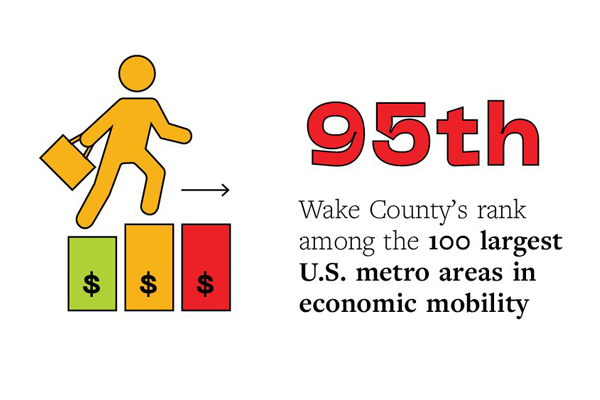BY LEIGH TAUSS, IndyWeek (Jan 28, 2020)
Unemployment in Wake County is among the lowest in the nation (3 percent), but the county ranks 95th out of the 100 largest U.S. metros for economic mobility—meaning nearly everyone has a job, but few people are moving up in the ranks.
Wake Works, a new partnership between Wake Tech and the county government, hopes to change that. The program, which offers tuition-free trade education through a salaried apprenticeship program, aims to not only help residents get a foot in the door but also to take a step up the economic ladder.
“We have folks who are working to make a better life for themselves and would benefit from additional job training but may not be in a position to quit their jobs and go back to school when they have to support themselves or their families,” Commissioner Matt Calabria told the INDY. “This gives folks an opportunity to learn a trade, earn income while they are doing it, and ultimately make a better life for themselves.”
The Wake County Board of Commissioners unanimously agreed to contribute up to $500,000 to cover the cost of tuition ($1,216 a semester for in-state students with a full course schedule), fees, books, tools, and uniforms for students enrolled in the program next fall.
Wake Tech will cover at least $300,000 in start-up costs and launch a marketing campaign. If enrollment exceeds capacity, Calabria says, the program will seek additional funding through grants and private partnerships.
Right now, Wake Tech has about 200 apprenticeships focusing on trades and manufacturing. Wake Works will add more than 300 apprenticeships, expanding to include health care and hospitality.
Apprentices will spend most of the program getting more than 2,000 hours of on-the-job experience in addition to 144 hours of classroom instruction. Starting salaries will be about $24 an hour, triple North Carolina’s $7.25 minimum wage.
The goal is “removing barriers” to education, Wake Tech vice president Matt Smith told county commissioners last week. “We exist to make sure that anyone in Wake County that wants an education can get an education. Our enemy is barriers.”
Those barriers tend to be systemic, bolstered by racial, gender, and economic inequality.
Commissioner James West pointed out the highest concentration of Wake Tech students lives in the 27610 zip code, which encompasses Southeast Raleigh. The problem, he said, is that “the folks that normally need [this support] the most do not normally actively participate in our city process.”
To that end, Wake Works will try to actively recruit minorities and women who are underrepresented in the trades. Enrollment will be first-come, first-serve, with no age limits.
Consumers in the Triangle may also benefit, Calabria says, as there are “critical labor shortages that are holding our businesses back.”
“They are the people who build our houses, who wire our offices, who weld our machines, who unclog our drains,” Calabria says. “If you don’t have someone who can answer the phone when your air conditioning goes out, and it’s 95 degrees out this summer, you’re going to be waiting for a while.”
